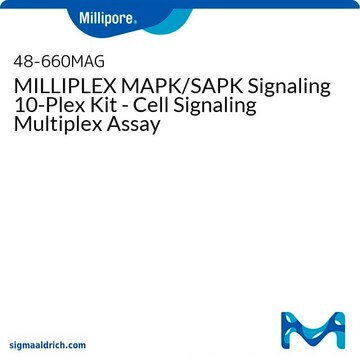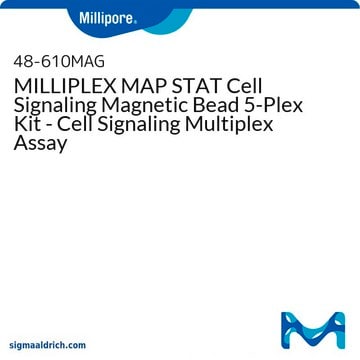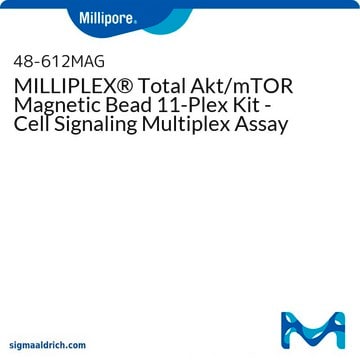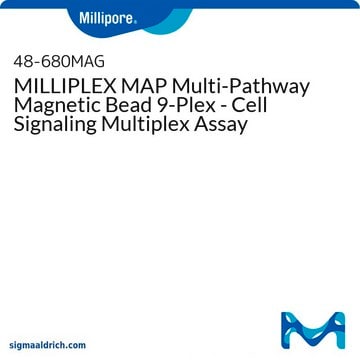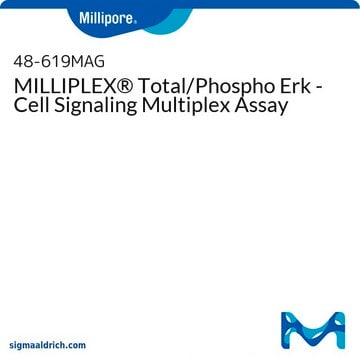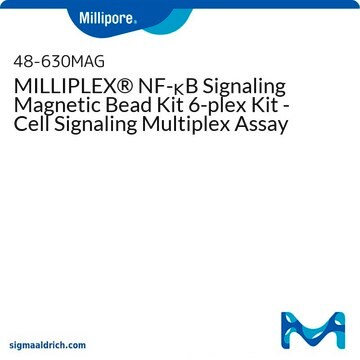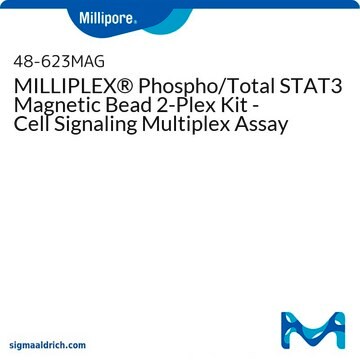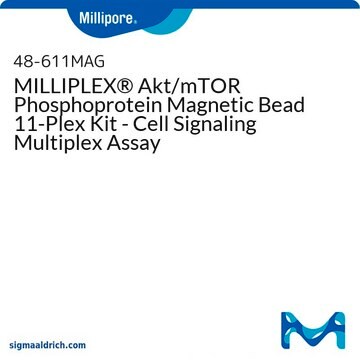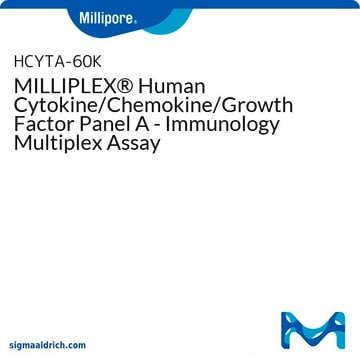HPRTKMAG-01K
MILLIPLEX® RTK Phosphoprotein Magnetic Bead Panel- Cell Signaling Multiplex Assay
allows simultaneous relative quantitation of multiple proteins in tissue and cell lysate samples
Sign Into View Organizational & Contract Pricing
All Photos(3)
About This Item
UNSPSC Code:
12161503
eCl@ss:
32161000
NACRES:
NA.47
Recommended Products
Quality Level
species reactivity
human
manufacturer/tradename
Milliplex®
technique(s)
multiplexing: suitable
detection method
fluorometric (Luminex xMAP)
shipped in
ambient
General description
RTKs (Receptor Tyrosine Kinases) are transmembrane proteins that act as receptors for growth factors, neurotrophic factors and other extracellular signaling molecules. Upon binding extracellular ligands, RTKs can undergo receptor dimerization and tyrosine phosphorylation on specific residues in the cytoplasmic tails which then lead to RTK-mediated signal transduction. Of the greater than 500 known protein kinases in human genome, approximately 60 are members of the RTK family. They are central components of cell signaling networks and play crucial roles in normal physiological processes and disease processes ranging from diabetes to cancer.
The MILLIPLEX® RTK Phosphoprotein Bead Customizable Panel is used to detect changes in phosphorylated (panTyr) c-Kit, c-Met/HGFR, EGFR, ErbB2/HER2, ErbB3/HER3 , ErbB4/HER4 , FGFR1 , FLT3 , IGF-1R, M-CSFR, PDGFRα, PDGFRβ, TIE1, TIE2, VEGFR1, VEGFR2, and VEGFR3 in cell lysates using the Luminex® system.
The MILLIPLEX® portfolio offers the broadest selection of analytes across a wide range of pathways. Once the panel of interest has been identified, you can rely on the quality we build into each kit to produce results you can trust. Performance criteria evaluated during the validation process include: cross-reactivity, assay CVs, kit stability, and sample behavior. In addition, each kit meets stringent Quality Control criteria to ensure lot-to-lot reproducibility.
The MILLIPLEX® RTK Phosphoprotein Bead Panel includes:
Panel Type: Cell Signaling
The MILLIPLEX® RTK Phosphoprotein Bead Customizable Panel is used to detect changes in phosphorylated (panTyr) c-Kit, c-Met/HGFR, EGFR, ErbB2/HER2, ErbB3/HER3 , ErbB4/HER4 , FGFR1 , FLT3 , IGF-1R, M-CSFR, PDGFRα, PDGFRβ, TIE1, TIE2, VEGFR1, VEGFR2, and VEGFR3 in cell lysates using the Luminex® system.
The MILLIPLEX® portfolio offers the broadest selection of analytes across a wide range of pathways. Once the panel of interest has been identified, you can rely on the quality we build into each kit to produce results you can trust. Performance criteria evaluated during the validation process include: cross-reactivity, assay CVs, kit stability, and sample behavior. In addition, each kit meets stringent Quality Control criteria to ensure lot-to-lot reproducibility.
The MILLIPLEX® RTK Phosphoprotein Bead Panel includes:
- Positive and negative control cell lysates provided to qualify assay performance
- Configurable beads to capture analytes of interest
- Optimized detection antibody cocktail designed to yield consistent analyte profiles within a panel
Panel Type: Cell Signaling
Specificity
Cross-reactivity between the antibodies and any of the other analytes in this panel is non-detectable or negligible.
Application
- Analytes: c-Kit, c-Met/HGFR (panTyr), EGFR (pan Tyr), ErbB2/HER2, ErbB3/HER3 (panTyr) ,ErbB4/HER4 (panTyr), FLT3 (pan Tyr), IGF-1R (pan Tyr), M-CSFR (pan Tyr), PDGFR-α (pan Tyr), PDGFRß (pan Tyr), TIE1 (pan Tyr,) Tie2 (pan Tyr), VEGFR1 (pan Tyr), VEGFR2 (pan Tyr), VEGFR3 (pan Tyr), FGFR1
- This 17-plex panel, unlike most signaling kits that are fixed/premixed, is customizable so that it is possible to choose only those analytes that are wanted or needed.
- Recommended Sample type: cell lysate
- Recommended starting concentration: 40 to 1,000 μg protein/mL
- Assay Run Time: Overnight
- Research Category: Signaling Apoptosis & Cancer
Features and Benefits
Design your multiplex kit by choosing available analytes within this panel.
Packaging
96-well plate
Storage and Stability
Recommended storage for kit components is 2 - 8°C.
Legal Information
Luminex is a registered trademark of Luminex Corp
MILLIPLEX is a registered trademark of Merck KGaA, Darmstadt, Germany
Disclaimer
Unless otherwise stated in our catalog or other company documentation accompanying the product(s), our products are intended for research use only and are not to be used for any other purpose, which includes but is not limited to, unauthorized commercial uses, in vitro diagnostic uses, ex vivo or in vivo therapeutic uses or any type of consumption or application to humans or animals.
Signal Word
Danger
Hazard Statements
Precautionary Statements
Hazard Classifications
Acute Tox. 4 Oral - Aquatic Acute 1 - Aquatic Chronic 2 - Eye Dam. 1 - Skin Irrit. 2
Storage Class Code
10 - Combustible liquids
Certificates of Analysis (COA)
Search for Certificates of Analysis (COA) by entering the products Lot/Batch Number. Lot and Batch Numbers can be found on a product’s label following the words ‘Lot’ or ‘Batch’.
Already Own This Product?
Find documentation for the products that you have recently purchased in the Document Library.
Adam Stewart et al.
Molecular cancer therapeutics, 18(8), 1396-1404 (2019-07-03)
It is increasingly appreciated that drug response to different cancers driven by the same oncogene is different and may relate to differences in rewiring of signal transduction. We aimed to study differences in dynamic signaling changes within mutant KRAS (KRAS
Elizabeth A Coker et al.
Molecular cancer therapeutics, 21(6), 1020-1029 (2022-04-04)
We hypothesize that the study of acute protein perturbation in signal transduction by targeted anticancer drugs can predict drug sensitivity of these agents used as single agents and rational combination therapy. We assayed dynamic changes in 52 phosphoproteins caused by
Ahmet Acar et al.
Nature communications, 11(1), 1923-1923 (2020-04-23)
Drug resistance mediated by clonal evolution is arguably the biggest problem in cancer therapy today. However, evolving resistance to one drug may come at a cost of decreased fecundity or increased sensitivity to another drug. These evolutionary trade-offs can be
Our team of scientists has experience in all areas of research including Life Science, Material Science, Chemical Synthesis, Chromatography, Analytical and many others.
Contact Technical Service